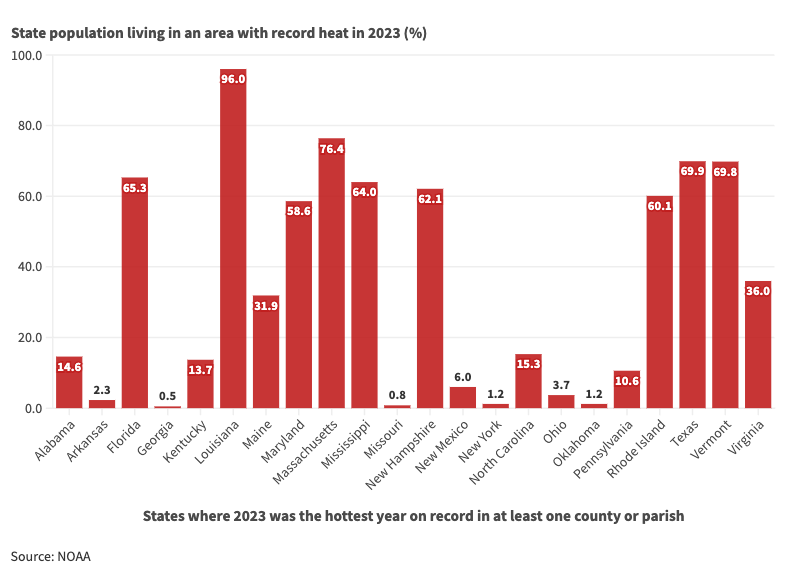Rising temperatures brought record-breaking heat to over 60 million Americans in 2023

In January 2024, the National Oceanic and Atmospheric Administration officially confirmed what had been suspected for months – that 2023 was the hottest year on record by a wide margin. According to NOAA, Earth’s average surface temperature last year was 2.12 degrees Fahrenheit higher than in the 20th century, and 2.43 degrees above the pre-industrial average, recorded between 1850 and 1900.
Notably, there were parts of the world that did not report record-breaking heat last year, including Asia, Europe, and Oceania. Still, average temperatures hit all-time highs in Africa, South America, and North America – including many parts of the United States.
NOAA has been tracking average temperatures in the continental United States at the county level since 1901, and the latest annual readings show that 2023 was the hottest year in 400 U.S. counties and county equivalents. These counties, parishes, and independent cities span 22 of the lower 48 states and are home to more than 60.7 million Americans.
Historic highs were most widespread in Louisiana, where 57 of the state’s 64 parishes – home to 96% of Louisiana residents – reported record-breaking heat in 2023. Meanwhile, more than 75% of Massachusetts’ population resides in a county that experienced record-high temperatures, as do 70% of the populations of both Texas and Vermont.
Other hard hit places include Florida, Maryland, Mississippi, New Hampshire, and Rhode Island. In each of these states, over half the population live in a county that broke heat records in 2023.
While global temperatures exceeded the 20th century average by just over 2 degrees last year, in many parts of the U.S., the difference was far greater. There were 44 counties and county equivalents where the record-high temperatures exceeded the 20th century average by more than double the global anomaly. These places include Chittenden County and Lamoille County, Vermont, where average temperatures in 2023 exceeded the 20th century mean by a nation-leading 5 degrees Fahrenheit.
For many of these counties, 2023 will not likely rank as the warmest year for long. According to researchers at NOAA, there is a one-in-three chance that 2024 will be hotter than 2023 – and 2024 ranking among the five hottest years on record is a virtual certainty.

More from ClimateCrisis 247
- Africa’s Air Condition Ruining Environment
- The World Breaks Hottest Day Record Two Days In A Row
- Next Tropical Storm Will Be Named “Chris”
- Phoenix To Be Above 110 Degrees Extreme Heat All Week






